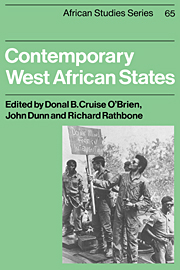2 - Burkina Faso
Between feeble state and total state, the swing continues
Published online by Cambridge University Press: 10 December 2009
Summary
Since the coup d'état of 25 November 1980 that brought an end to the civilian regime of the Third Republic led by General Sangoulé Lamizana, Upper Volta (rebaptised Burkina Faso in August 1984) has gone into an infernal spiral of political instability. In a little more than seven years, no less than four takeovers by force have resulted in the replacement of the ruling team. The latest misadventure to date is the fall and death of Captain Sankara and the replacement of the Conseil National de la Révolution (CNR), over which he had presided since his seizure of power on 4 August 1983, by a Front Populaire headed by Captain Blaise Compaoré, once the intimate friend of Thomas Sankara and his second in command within the CNR.
At the time of writing, if the underlying causes of this change are in essentials known, it is still premature to draw conclusions as to the future political orientation of Burkina. But the relative ease with which the regime of Thomas Sankara was toppled, as well as the timidity of the popular reactions which followed his death, are bound to raise disturbing questions about the extent of institutionalisation of a government drawing its legitimacy from its revolutionary character and its proclaimed will to give voice to the people.
- Type
- Chapter
- Information
- Contemporary West African States , pp. 13 - 30Publisher: Cambridge University PressPrint publication year: 1990

